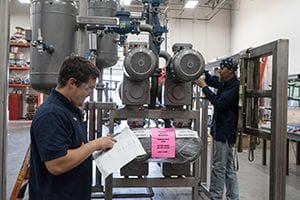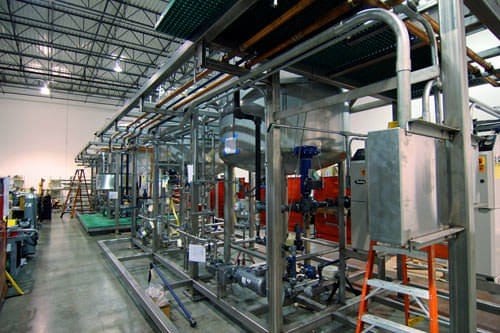Modular process design and fabrication is a very specific approach to building process systems and plants. Most often it involves designing the systems into portable skids. These skids are self-contained units that can be stacked or rearranged in different formations to add to or form entire plants.
Skids are assembled in a controlled environment (indoors) in fabrication facilities for greater efficiency and working conditions. They are built on a parallel timeline with onsite civil and facilities construction, to decrease project time. EPIC Modular Process systems advocates the use of modules in process system design because it delivers the following five major advantages:
1. Faster Time To Market
- Project time can be dramatically shortened if fabrication, assembly, and testing of the process system occur during any site civil and facilities construction. In a traditional project timeline, site civil and facilities must be completed before any process system work can begin. Since process systems are being assembled off-site into easily transportable skids, modular process systems can be developed in parallel with civil and facilities construction.
- Start-up timeis also minimized since systems can be fully assembled and tested before they ship, reducing the amount of on-site start-up time.
- Weather delays are eliminated during process system development since skids are assembled indoors.
2. Reduced Costs
- Lower labor and operational costs are achieved due to a shorter project timeline, efficient use of material, and a smaller field crew
- For multi-unit projects, higher capital efficiency is achieved by designing once and building duplicates
- Off-site module construction does not interrupt or shut-down pre-existing operations
3. Safety Benefits
- Safety risks are reduced for modular process plant personnel with fewer onsite OSHA exposure hours and smaller crew sizes
- Ideal construction conditions provided by an enclosed fabrication facility further reduce safety risk for fabricators
- Full modular process system testing and checkout prior to shipment identifies and corrects any potential problems before the system is delivered on-site
4. Fewer Resource Requirements
Production style assembly and perfect construction conditions reduce material waste. Components are simplified as much as possible to reduce overall construction costs and part maintenance complexities.
- Smaller field crews are required on the construction site because modules are not assembled there. Also, the need to find process system assembly and fabrication technicians is eliminated because they are already employed by the modular fabrication shop.
- Less on-site space requirements because systems are assembled in pre-existing shops and modular designs aim to best utilize space layout and existing plant conditions to plan for the implementation of a new system. For example, stacking modular skids may save space where a traditional layout would not be able to support such a vertical layout.
5. Higher Quality Assembly and Fabrication
- Welding, pipe-fitting and other fabrication processes are performed under ideal conditions
- Highly trained and experienced assembly and fabrication technicians are already employed by the modular system provider, ensuring consistent work and worker availability.
And for anyone looking to keep your proprietary modular process under wraps, modular construction inside a shop provides the perfect veil of secrecy. To learn more about the modular process plants that EPIC builds, view our website or contact an engineer today.


 Production style assembly and perfect construction conditions reduce material waste. Components are simplified as much as possible to reduce overall construction costs and part maintenance complexities.
Production style assembly and perfect construction conditions reduce material waste. Components are simplified as much as possible to reduce overall construction costs and part maintenance complexities.